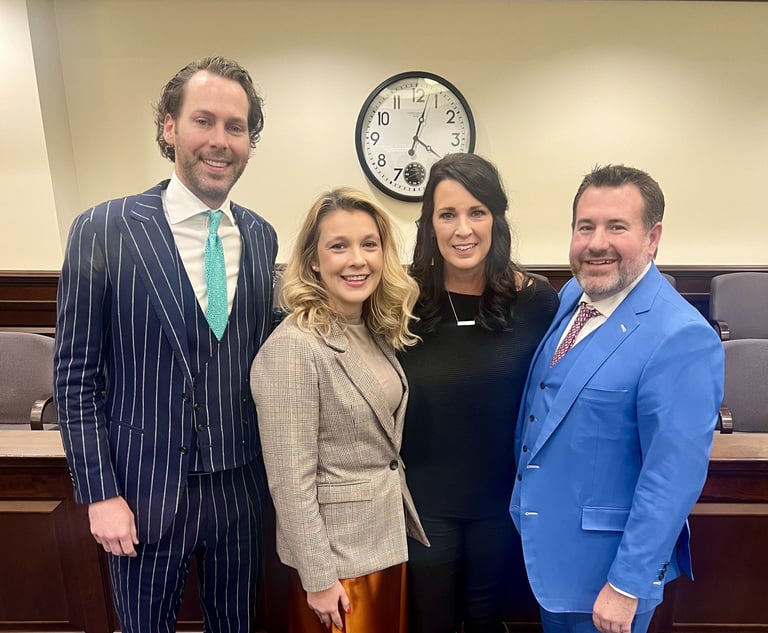Another Federal Judge Says Landmark Pa. Stacking Decision Applies Retroactively
The second Eastern District federal judge in as many months has ruled that the Pennsylvania Supreme Court's "seismic" decision in Gallagher v. Geico, which invalidated the household vehicle exclusion as a means of getting around providing stacking coverage, should apply retroactively.
June 20, 2019 at 02:50 PM
5 minute read
 Photo credit: Rawpixel.com/Shutterstock.com
Photo credit: Rawpixel.com/Shutterstock.com
The second Eastern District federal judge in as many months has ruled that the Pennsylvania Supreme Court's “seismic“ decision in Gallagher v. Geico, which invalidated the household vehicle exclusion as a means of getting around providing stacking coverage, should apply retroactively.
In a June 17 decision in Stockdale v. Allstate Fire and Casualty Insurance, U.S. District Judge Wendy Beetlestone of the Eastern District of Pennsylvania denied Allstate Fire and Casualty Insurance's motion to dismiss plaintiff Kayla Stockdale's putative class action, one of several similar lawsuits alleging insurance companies improperly used household exclusions to bar stacked coverage as far back as 1990.
But Beetlestone did find that claims predating Jan. 23, 2015, were time-barred.
The Supreme Court's Gallagher decision, from Jan. 23, held that a household exclusion in a policy issued by defendant Geico violated the Motor Vehicle Financial Responsibility Law because it acted as a “de facto waiver” of stacked coverage. The ruling reversed a Superior Court decision, which had relied on two prior Supreme Court decisions that had both failed to achieve a majority, and, according to several attorneys, it marked a significant departure from precedent.
Stockdale's suit against Allstate was one of five proposed class actions filed the same day Gallagher came down. Like some of the other defendants in those cases, Allstate argued in Stockdale that, prior to the Gallagher decision, insurers denied benefits based on household exclusions in accordance with established court precedent that specifically allowed the practice.
But in her June 17 opinion in Stockdale, Beetlestone predicted the state Supreme Court would apply Gallagher both retroactively and prospectively and said the insurance industry's reliance on previous court rulings “does not justify selective prospectivity.”
“The Pennsylvania Supreme Court in Gallagher stated as much: while 'recogniz[ing] that this decision may disrupt the insurance industry's current practices,' the Gallagher court nevertheless invalidated the household exclusion, explaining 'we are confident that the industry can and will employ its considerable resources to minimize the impact of our holding,'” Beetlestone said.
Beetlestone also said “the purpose of the Gallagher rule would be undermined by limiting its application.”
“The Gallagher court held that the household exclusion 'operate[d] as a pretext to avoid stacking,' which 'violate[d] the clear mandates of the waiver provisions of [the MVFRL]' and 'render[ed] the … exclusion invalid and unenforceable,'” Beetlestone said. “Subjecting the Gallagher rule to selective prospectivity, however, would allow insurance companies to enforce the 'unenforceable' exclusion, at least where, as here, the events giving rise to an insured's claim predate the decision. There is no indication that the Pennsylvania Supreme Court intended such an outcome; rather, the Gallagher court held generally that 'these exclusions are unenforceable as a matter of law,' without any caveat or reservation.”
Beetlestone also said purely prospective application of Gallagher “would impose an administrative burden on the courts, which would have to engage in difficult line-drawing exercises without clear guidance from the Pennsylvania Supreme Court—such as determining whether Gallagher governed cases concerning contracts entered into prior to the decision's pronouncement, but concerning facts that postdate the decision.”
Beetlestone said Stockdale's case is a prime example of that concern.
“There is no meaningful distinction between plaintiff and the petitioner in Gallagher: both purchased automotive insurance that contained household exclusions; at the time of their respective accidents, Pennsylvania law recognized the validity of the exclusion; and, both had their stacked claim denied on the basis of that exclusion,” Beetlestone said. “And yet, under defendant's approach, the Gallagher plaintiff would be entitled to relief, while plaintiff would not be—simply because she initiated her suit after the plaintiff in Gallagher initiated (and won) his. Justice does not countenance such a result.”
Beetlestone then turned to Allstate's contention that, if Gallagher was found to apply retroactively, it should bar claims predating 2015.
Noting the four-year statute of limitations governing putative class claims in Pennsylvania, Beetlestone agreed with the insurer's position.
“Here, plaintiff seeks to 'represent a class of persons injured in motor vehicle accidents from 1990 to the present,' who were denied coverage 'by reason of the household exclusion,'” Beetlestone said. “The face of the complaint demonstrates, however, that the statute of limitations bars claims in which an insurer denied coverage or refused to arbitrate because of the household exclusion prior to January 23, 2015—four years before plaintiff filed this putative class action.”
Beetlestone's ruling in Stockdale came about two months after U.S. District Judge Mark Kearney of the Eastern District of Pennsylvania ruled in another proposed class action, Butta v. Geico, that Gallagher should apply retroactively.
But while the two rulings ultimately reached the same conclusion, they did differ in one key way.
Kearney had found that Gallagher should apply retroactively because the court did not announce a new rule of Pennsylvania law. He based this determination on the fact that the Supreme Court's prior ruling on the household exclusion issue, in 2008's Erie Insurance Exchange v. Baker, was not binding precedent because it was plurality opinion.
Beetlestone, meanwhile, determined that Gallagher did announce a new rule of law.
“Even if the Pennsylvania Supreme Court was not bound by its prior decisions in Baker, it nevertheless announced a new rule of law because the decision modified or altered [those] earlier decisions,” she said.
Nevertheless, Beetlestone said retroactivity was still proper.
Stockdale is represented by James Haggerty of Haggerty, Goldberg, Schleifer & Kupersmith in Philadelphia and Scott Cooper of Schmidt Kramer in Harrisburg.
“This decision is important because although it finds Gallagher did enunciate a new rule the court found that it should be applied retroactively under a cogent and fair analysis of the issues,” Haggerty said.
Allstate's attorney, Mark Levin of Ballard Spahr in Philadelphia, could not be reached for comment.
This content has been archived. It is available through our partners, LexisNexis® and Bloomberg Law.
To view this content, please continue to their sites.
Not a Lexis Subscriber?
Subscribe Now
Not a Bloomberg Law Subscriber?
Subscribe Now
NOT FOR REPRINT
© 2025 ALM Global, LLC, All Rights Reserved. Request academic re-use from www.copyright.com. All other uses, submit a request to [email protected]. For more information visit Asset & Logo Licensing.
You Might Like
View All
Philadelphia Eagles 0-2 in Attempts to Recover Insurance on COVID-Related Losses
4 minute read
High Verdicts and Venue Rule Land Pa. Courts on Top of 'Judicial Hellhole' List
5 minute read

Judge Approves $667K Settlement Against Independence Blue Cross for Unpaid, Pre-Shift Computer Work
4 minute readTrending Stories
- 1'Nation is in Trouble': NY Lawmakers Advance Bill to Set Parameters for Shielding Juror IDs in Criminal Matters
- 2Margolis Edelstein Broadens Leadership With New Co-Managing Partner
- 3Menendez Asks US Judge for Bond Pending Appeal of Criminal Conviction
- 4Onit Acquires Case and Matter Management Software Provider Legal Files Software
- 5As Nonprofits Plead for Answers, Dem AGs Plan Suit to Block Trump Funding Freeze
Who Got The Work
J. Brugh Lower of Gibbons has entered an appearance for industrial equipment supplier Devco Corporation in a pending trademark infringement lawsuit. The suit, accusing the defendant of selling knock-off Graco products, was filed Dec. 18 in New Jersey District Court by Rivkin Radler on behalf of Graco Inc. and Graco Minnesota. The case, assigned to U.S. District Judge Zahid N. Quraishi, is 3:24-cv-11294, Graco Inc. et al v. Devco Corporation.
Who Got The Work
Rebecca Maller-Stein and Kent A. Yalowitz of Arnold & Porter Kaye Scholer have entered their appearances for Hanaco Venture Capital and its executives, Lior Prosor and David Frankel, in a pending securities lawsuit. The action, filed on Dec. 24 in New York Southern District Court by Zell, Aron & Co. on behalf of Goldeneye Advisors, accuses the defendants of negligently and fraudulently managing the plaintiff's $1 million investment. The case, assigned to U.S. District Judge Vernon S. Broderick, is 1:24-cv-09918, Goldeneye Advisors, LLC v. Hanaco Venture Capital, Ltd. et al.
Who Got The Work
Attorneys from A&O Shearman has stepped in as defense counsel for Toronto-Dominion Bank and other defendants in a pending securities class action. The suit, filed Dec. 11 in New York Southern District Court by Bleichmar Fonti & Auld, accuses the defendants of concealing the bank's 'pervasive' deficiencies in regards to its compliance with the Bank Secrecy Act and the quality of its anti-money laundering controls. The case, assigned to U.S. District Judge Arun Subramanian, is 1:24-cv-09445, Gonzalez v. The Toronto-Dominion Bank et al.
Who Got The Work
Crown Castle International, a Pennsylvania company providing shared communications infrastructure, has turned to Luke D. Wolf of Gordon Rees Scully Mansukhani to fend off a pending breach-of-contract lawsuit. The court action, filed Nov. 25 in Michigan Eastern District Court by Hooper Hathaway PC on behalf of The Town Residences LLC, accuses Crown Castle of failing to transfer approximately $30,000 in utility payments from T-Mobile in breach of a roof-top lease and assignment agreement. The case, assigned to U.S. District Judge Susan K. Declercq, is 2:24-cv-13131, The Town Residences LLC v. T-Mobile US, Inc. et al.
Who Got The Work
Wilfred P. Coronato and Daniel M. Schwartz of McCarter & English have stepped in as defense counsel to Electrolux Home Products Inc. in a pending product liability lawsuit. The court action, filed Nov. 26 in New York Eastern District Court by Poulos Lopiccolo PC and Nagel Rice LLP on behalf of David Stern, alleges that the defendant's refrigerators’ drawers and shelving repeatedly break and fall apart within months after purchase. The case, assigned to U.S. District Judge Joan M. Azrack, is 2:24-cv-08204, Stern v. Electrolux Home Products, Inc.
Featured Firms
Law Offices of Gary Martin Hays & Associates, P.C.
(470) 294-1674
Law Offices of Mark E. Salomone
(857) 444-6468
Smith & Hassler
(713) 739-1250





